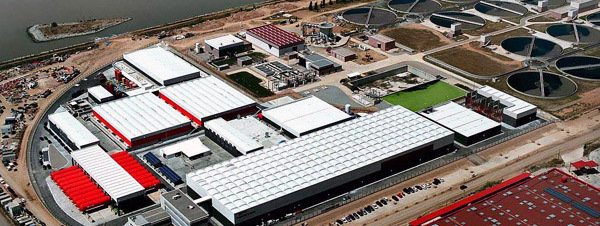
Since when on the Valentine's Day 2012, the Generalitat de Catalunya decided to convene the Adjudication Board of ATLL (Aigües Ter-Llobregat, the Ter-Llobregat rivers water company) to privatise this public company, chaos and incompetence were the two most-used words by journalists to define a process that is still in the courts, and has left the incompetence of a politician called Andreu Mas-Colel clearly in evidence, and also the darker side of the Government of Artur Mas, who was forced to return to the starting point for his own OARCC (Tribunal Català de Contractes del Sector Públic, the Catalonian Tribunal of Public Sector Contracts) and the Supreme Court have clearly and emphatically disauthorised him. Never in Catalonia had such nonsense been seen that, surely, will help in the most prestigious business schools in the world to use whole process as a textbook for future leaders to learn how "not to privatise a public company". If these are the structures of state that the current Catalonian leaders are going tol design, we the citizens of Catalonia are in a bad way.
A made-to-measure adjudication
The history of this political fudge began in 2012, which was the largest privatisation ever approved by the Generalitat, in some economic times when the risk premium Spanish was around 600 points, a circumstance that any middling manager knows that is the worst-case scenario for privatising since you pay for the pleasure and desire in interest, as is already happening at the suffering taxpayers' expense. In addition, the interest rate will not be reviewed for 50 years. It was precisely then, and with the addition of a desperate need for liquidity for Mas' government, when an Adjudication Board announced the good news that Acciona was the winner of the contest for the exploitation of Aguas Ter-Llobregat (ATLL), a public company that managed water from river basins to municipal deposits. The contract, 1,000 million Euros, affected no less than five million Catalonians, who are the consumers of this drinking water generated by ATLL.
The visible face of this award by the hand of his "charismatic" leader Andreu Mas-Colell, the powerful boss of the Economy of the government of Catalonia, was the Minister of Planning and Sustainability, Lluís Recoder who, hiding behind what experts defined as "made-to-measure conditions", defended relentlessly and uncompromisingly the decision taken by the members of the Adjudication Board, which ruled in favour consortium led by the company Acciona, owned by the Entrecanales family -the upper echelons of Spanish capitalism- against another company, with headquarters in Barcelona and international presence precisely in the water sector, won by a landslide on their technical section but then were excluded, despite their renowned solvency -La Caixa is one of their shareholders- from the 50-year concession, in a somewhat "suspicious" manner in the economic section. To cite an example that clarifies this statement, we note that the conditions required of them aspiring to the specifications contained the requirement that 80 million Euros of their resources were devoted to the "water business". Acciona could only just show 84 million and were about to lose the concession of the city of Cáceres, something that if it occurred, would have invalidated them to compete for the ATLL. Their opponent Agbar widely surpassed this.
In addition, the technical requirement was to manage a 20,000 m3 drinking water treatment plant while Cardedeu has a capacity of 800,000 m3. Something that someday someone will explain why these requirements were so low. Does it have something to do with the water treatment plants that ACCIONA was managing at that time?. In light of the fact that the tender data was loaded with imprecisions and ambiguities that later served to biased interpretations of those "interested" in the ATLL business.
What most caught our attention of us journalists who followed the process was the appearance that surrounded it. It seemed as if Acciona "someone had sung to them" what to offer in its financial proposal, in order to earn the points they needed to win, because they knew their benefactors, if there were any, that in the technical section they had it all lost by a landslide, given the experience and prestige of AGBAR in the global water sector. Once accomplished what was later undone by the Supreme Court, the contract was signed on December 27, 2012, a highly suspicious date, as the new Councillor, Santi Vila took possession on the same day, the then acting director of the ACA, Leonard Carcolé a former director of Aguas de Barcelona had long been fired from this company for its manifest incompetence and disloyalty had the "la Saeta rubia" (the blond arrow) thus been fulfilled, the nickname by which he was known in the industry, his personal vendetta against the company had sacked him him? We will never know, but what we do know is that Acciona signed a document and is waiting for a final resolution. Now that we know the judgment, the question is very simple: if there is no contract, what the Government is going to pay the Entrecanales? Should they not even have to repay public money?
The answers to difficult questions will become properly clear over time. What if we already know is that after the contract signing and the almost clandestine pictures of the event, a tough court case began in which both Acciona and the Generalitat have publicly come out naked. The story is now long gone, the claim that the Minister Recoder, great milker of privatisation and signer of unusual reports, did, that the viability plan submitted was "unreal", an outrage that was shouted from the rooftops, while the Catalunya Press journalists asked for a mysterious English company called Aguas de Catalunya Ltd. -founded during the days of the award and of which, today, we do not know who their real owners are, based in London and included in the winning group next to Acciona-, the Brazilian bank BTG Pactual, also favoured by the Mas Government in another privatisation outrageously expensive for the public purse Catalan, as Túneles del Cadí- and the local family office as always, that is to say the Torreblanca and Rodes families, closely linked to the Convergente powers. To top it all, in "il tempo" the "curious" fact was given that Fernando Rodés was, at once, a member of the board of Acciona and Chairman of the Advisory Council for Sustainable Development of the Generalitat, which, from all angles, is a case of manifest incompatibility.
Recoder's actions were "simply" lamentable preventing the file being seen by AGBAR, claiming confidentiality motivated by his own report. Finally AGBAR could access the file because the precautionary measures proposed in the TSJC, (Superior Court of Catalonia) where they went three times to overcome the resistance of the Department, for something as basic as consulting the record in order to raise the appeal to the OARCC.
In fact, the Department that Recoder ran was to blame for reaching the end of the year arrived and OARCC not having been resolved, since the obstruction of viewing the file caused a delayed more than 30 days. It was clear strategy: to make the most of the process to justify signing without OARCC resolution based on the need to balance accounts.










